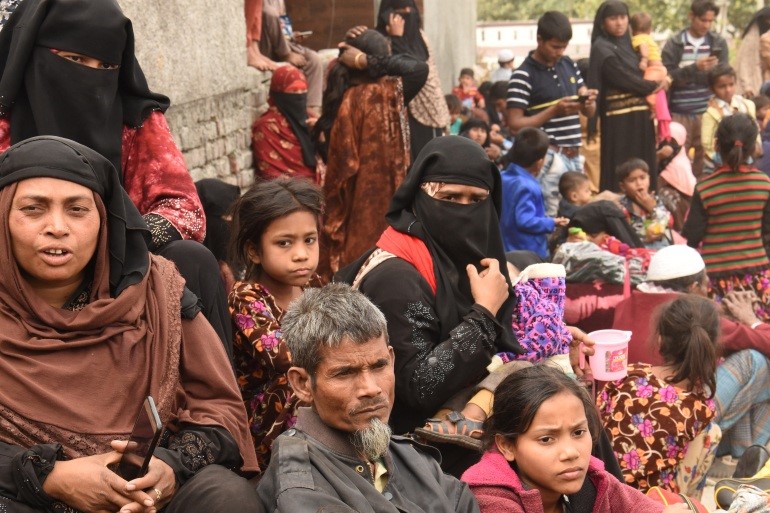Rights groups say the forced deportation of Rohingya to Myanmar is a ‘cruel disregard for human life and international law’.

Srinagar, Indian-administered Kashmir – The deportation of a 36-year-old Rohingya woman by Indian authorities and fresh detention of Rohingya refugees in Indian-administered Kashmir has been criticised by human rights groups, who called New Delhi’s forcible return of refugees a “cruel disregard for human life and international law”.
Hasina Begum, 36, who was detained on March 6, 2021, along with more than 100 other Rohingya refugees from Jammu city, was deported to Myanmar on March 22.
Since 2017, India has deported 16 Rohingya refugees back to Myanmar, according to rights groups, in violation of the principle of non-refoulment – which states that refugees should not be deported to places where they may face persecution.
India’s crackdown came less than two weeks after the United States said that Myanmar’s military committed genocide and crimes against humanity against the Rohingya, who have long faced persecution in their homeland.
For more than a year, Hasina was separated from her three children, two daughters, age eight and 12, and her 14-year-old son. Now, their hopes for a reunion have been dashed.
“The children have been crying since then,” Ali Johar, 39, Begum’s husband told Al Jazeera from a camp in Jammu where the family is currently living with more than 200 people who fled persecution in Rohingya in 2012.
“I have become hopeless as I, too, cry on seeing the longing of my children for their mother. They miss her. I don’t know what to tell them,” Johar said.
‘Discriminatory policies against religious minorities’
Meenakshi Ganguly, South Asia director at Human Rights Watch, said in a statement: “The Indian government gains nothing by forcibly returning a Rohingya woman to Myanmar, while she is separated from her children and put at grave risk.”
“The Indian authorities are increasingly adopting discriminatory policies against religious minorities, especially Muslims, and their policy toward the Rohingya appears to reflect that bigotry,” she said.
The police in the southern city of Jammu detained 155 Rohingya refugees, including Begum on March 6 last year. They were sent to a sub-jail that had been converted into a holding centre in Kathua district.
Johar said when the police crackdown in the refugee camps started last year, they were told that they had to go for a coronavirus test and a verification process but it turned out to be lengthy detention.
“Since last year the children would go and see her once a month. She was also allowed to make a phone call sometimes. The children would hear her voice. But now we do not know where she is? Whether she is dead or alive?” Johar said.
He said that while he had hidden the news initially from his children, they found out from other people as the news of his wife’s detention sparked fears of deportation among more than 5,000 refugees scattered in camps across Jammu.
“Whenever the children go out of the camp, they are told about their mother,” said Johar, who fled a military crackdown in Myanmar in 2012.
“We did not come here to live permanently. We will go back when the situation in Myanmar improves,” he said.
Rohingya face surveillance, arbitrary detentions
Rohingya refugees, who are predominantly Muslims, face strict surveillance, arbitrary detentions, questioning, and summons from the Indian security agencies. They also face hostilities and violent attacks by right-wing groups who accuse them of being associated with “terrorism”. Now, the greater risk they all face is deportation.
The hostility against the persecuted refugees has been exacerbated since Prime Minister Narendra Modi’s Hindu nationalist BJP swept to power in 2014.
On Friday, the police in the Ramban district of Indian-administered Kashmir said that they have detained 25 more Rohingya refugees.
According to UNHCR, there are an estimated 40,000 Rohingya refugees in India. Most of these refugees crossed the border into India fleeing persecution in Myanmar.
India defended the deportations by arguing that it is not a signatory to the 1951 United Nations Refugee Convention, which details the rights of refugees, and the legal obligations of countries to protect them.
Prem Kumar Modi, the jail superintendent at Hiranagar detention centre in Jammu, told Al Jazeera that Begum has been deported after “following the official procedure”.
Separated from their families
Like Begum, scores of people who are in detention have been separated from their families.
Five members of Mustafa Kamal’s family are in detention, including his 80-year-old father, his three brothers, and his sister-in-law.
Mustafa said his mother died in detention in June last year when her health deteriorated after contracting COVID-19.
“We are persecuted people but on this vast Earth, no one is ready to allow us to live. I keep on thinking about my father, my mother who died.”
Similar fears were shared by many Rohingya refugees who spoke to Al Jazeera.
Last year, India’s top court refused to intervene after activists petitioned against the government’s decision to deport Rohingya.
“We have been voicing concerns about them here. It is a security concern for us,” Ashok Kaul, the general secretary of the BJP in the region.
“The crimes have increased in Jammu and they can be involved in terrorism, also,” Kaul, who is based in Jammu, told Al Jazeera. He offered no evidence linking Rohingya to crimes.

